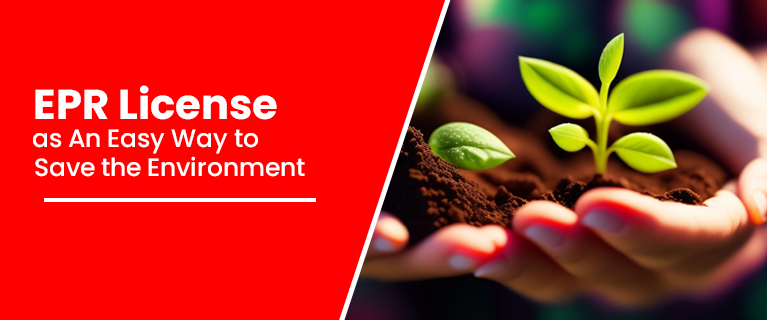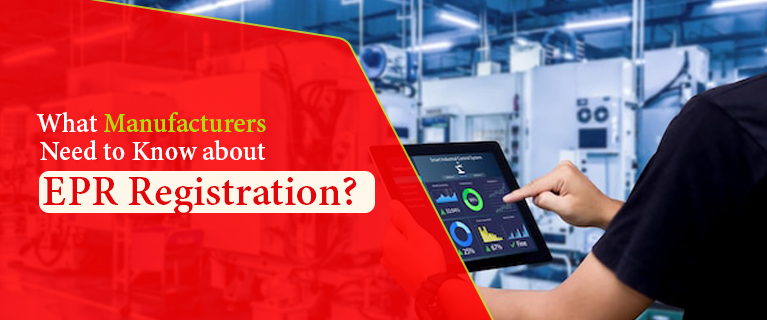EPR License As An Easy Way To Save The Environment
The rapidly increasing rate of environmental degradation has raised concerns worldwide, prompting individuals, businesses, and governments to seek sustainable solutions. Extended Producer Responsibility (EPR) is one such approach that plays a pivotal role in environmental conservation and waste management. EPR licenses offer a streamlined and effective way for businesses to fulfill their environmental responsibilities while contributing to a cleaner and greener planet. In this blog, we will explore how an EPR license can be an easy and impactful way to save the environment.
Understanding Extended Producer Responsibility (EPR)
Extended Producer Responsibility is a concept wherein the responsibility for a product's entire lifecycle, including after it becomes waste, lies with the producers or manufacturers. This principle aims to minimize the environmental impact of products and packaging by encouraging producers to take responsibility for their products' disposal, recycling, or safe disposal. EPR License ensures that producers adopt environmentally sustainable practices, reducing the burden on landfills and promoting the circular economy.
The Significance of EPR License in Environmental Conservation
1. Efficient Waste Management:
EPR licenses empower businesses to implement efficient waste management practices. By taking responsibility for collecting and recycling their products, producers contribute to reducing the volume of waste ending up in landfills and incinerators. This, in turn, minimizes greenhouse gas emissions and environmental pollution.
2. Resource Conservation:
EPR licenses promote resource conservation by encouraging the reuse, refurbishment, and recycling of products and materials. This reduces the need for raw materials, conserving natural resources and minimizing the environmental impact of resource extraction.
3. Minimizing Environmental Pollution:
By holding producers accountable for the proper disposal and recycling of their products, EPR licenses prevent environmental pollution caused by improper waste handling. This includes the contamination of water bodies, soil, and air, protecting ecosystems and human health.
4. Promoting Circular Economy:
EPR licenses align with the principles of the circular economy, wherein products are designed to be reused, refurbished, or recycled, thereby extending their lifecycle. This approach minimizes waste generation and maximizes the value extracted from products and materials.
5. Fostering Eco-Friendly Practices:
Obtaining an EPR license encourages businesses to adopt eco-friendly practices in product design, packaging, and waste management. It incentivizes sustainable innovations and green technologies, fostering a culture of environmental responsibility.
How to Obtain an EPR License
1. Research and Understand Applicable Regulations:
Begin by researching the EPR regulations applicable to your industry and region. Understand the scope of products covered under the EPR program and the specific responsibilities of producers.
2. Collaborate with an EPR Service Provider:
Engage with an accredited and authorized EPR service provider to understand the requirements and procedures for obtaining an EPR license. These service providers specialize in waste management and recycling and can guide you through the application process.
3. Gather Necessary Documentation:
Collect all the required documents and information necessary for the EPR license application. This may include details about your business, the products you manufacture, packaging specifications, waste collection mechanisms, and recycling plans.
4. Submit the Application:
Submit the completed application along with the required documentation to the designated regulatory authority or EPR service provider. Ensure that all information provided is accurate and up-to-date to expedite the review process.
5. Compliance and Auditing:
Once you have obtained the EPR license, ensure strict compliance with the regulations and reporting requirements. Periodic audits may be conducted to assess your environmental performance and adherence to waste management guidelines.
The Easy Way to Save the Environment
EPR licenses offer businesses an easy and effective way to contribute to environmental conservation and sustainability. By taking responsibility for the end-of-life phase of their products, businesses can play a vital role in reducing waste, conserving resources, and minimizing environmental pollution. EPR licenses align with the principles of the circular economy and promote eco-friendly practices, creating a positive impact on the environment and society.
Read Also This - How is an EPR Certificate Beneficial for ProducersConclusion
In conclusion, the environmental challenges faced today necessitate collective efforts from individuals, businesses, and governments to adopt sustainable practices. EPR licenses provide a clear and effective path for businesses to fulfill their extended producer responsibilities and contribute to environmental conservation. By promoting efficient waste management, resource conservation, and the circular economy, EPR licenses play a pivotal role in safeguarding our planet for future generations. Embracing an EPR license is not only an easy way to save the environment but also a responsible choice for businesses seeking to make a meaningful impact on the world.




Comments
Post a Comment